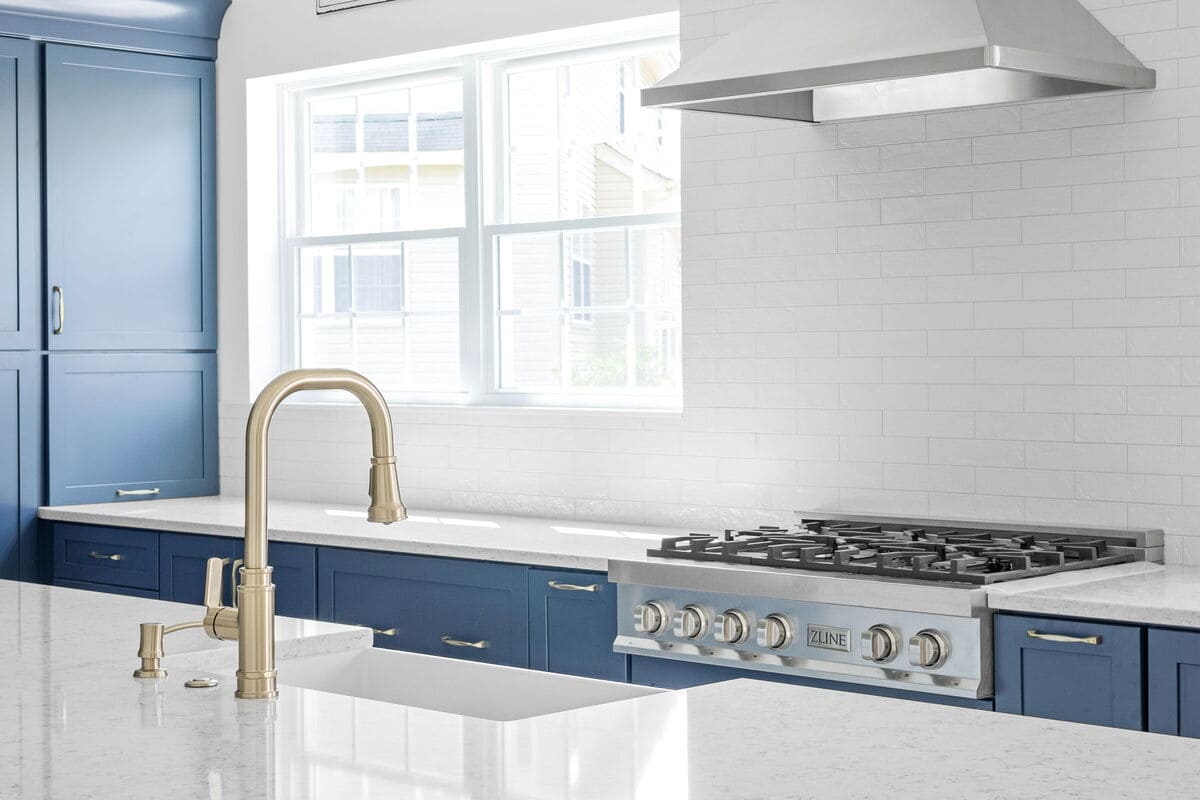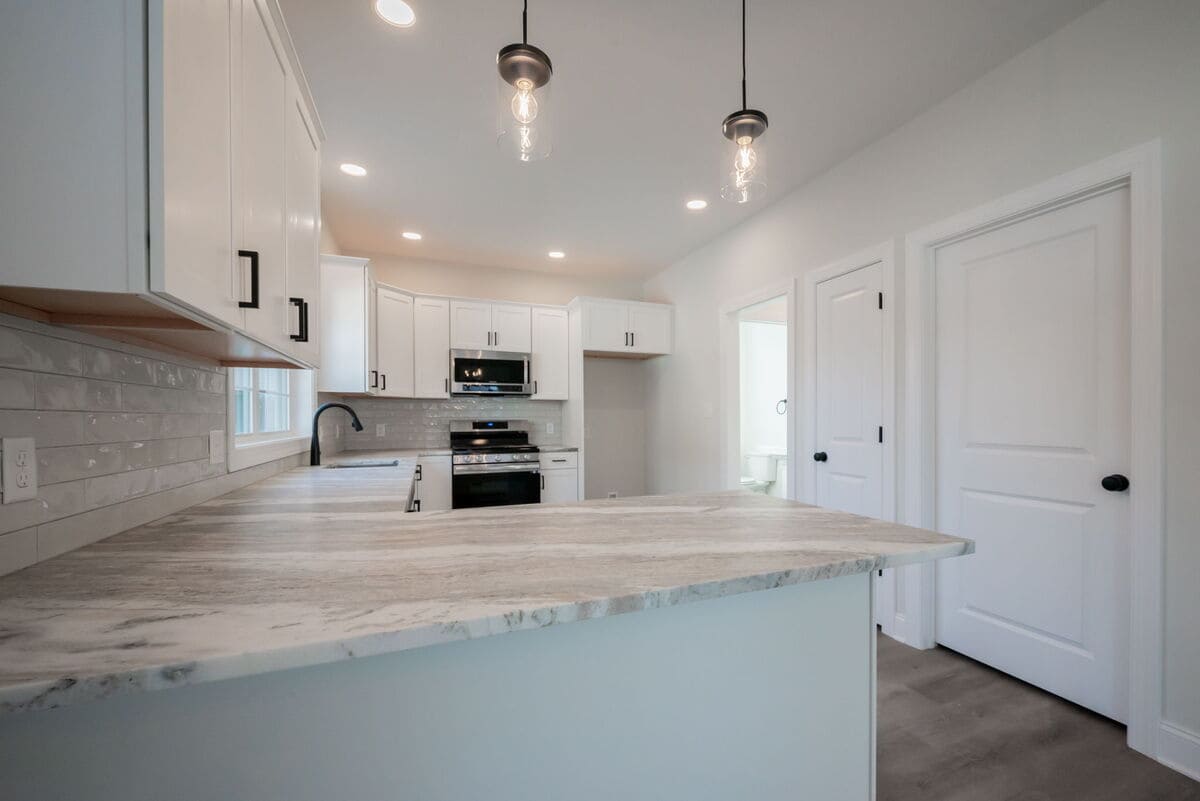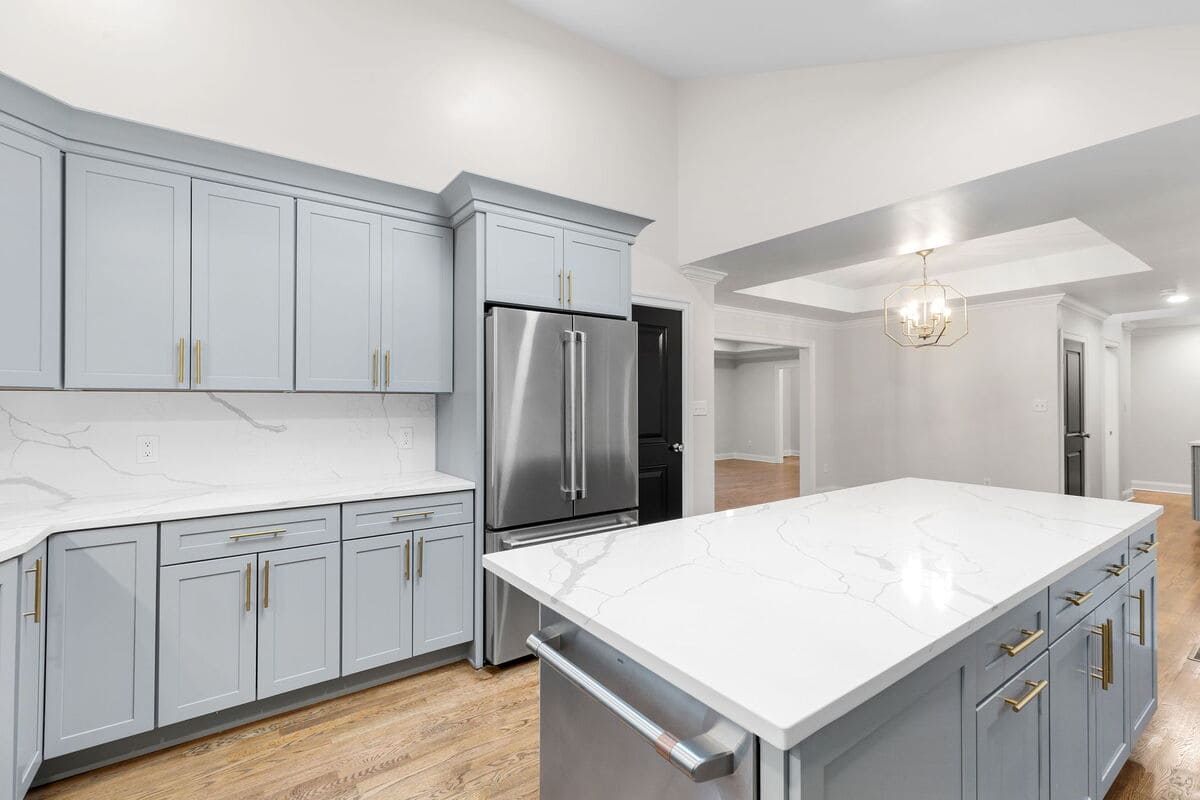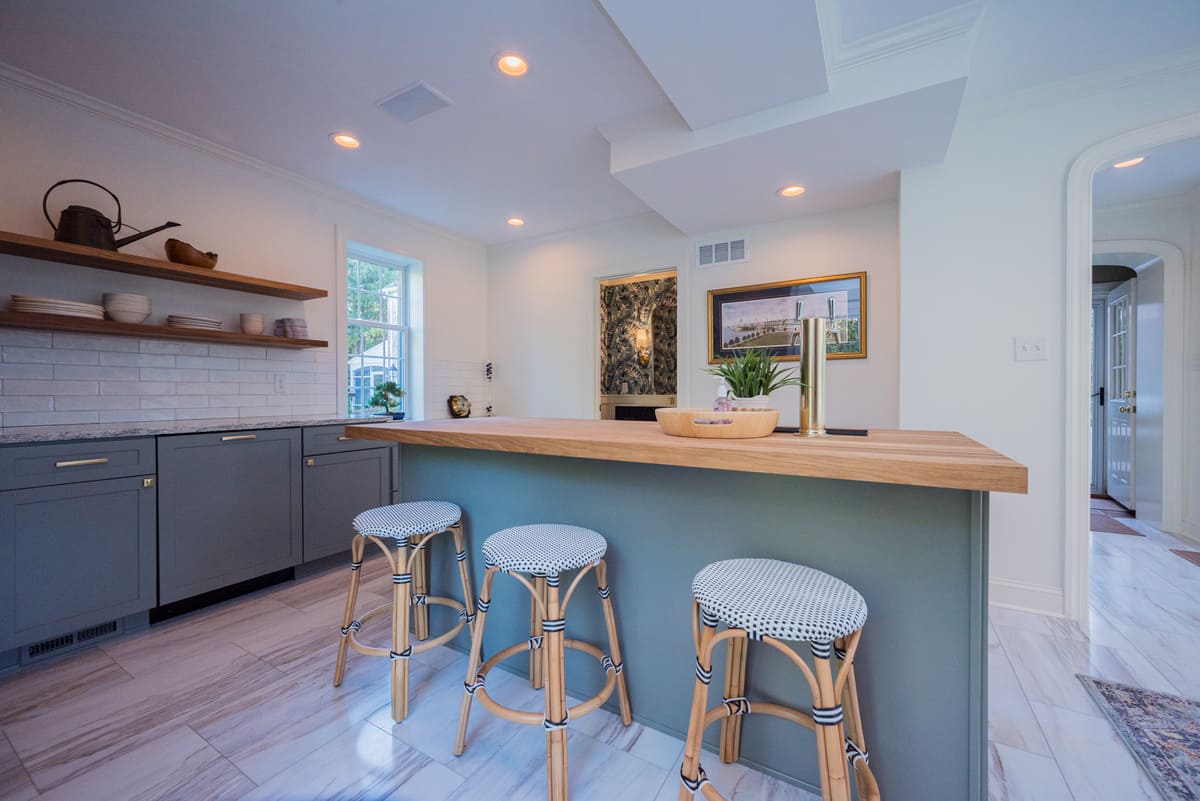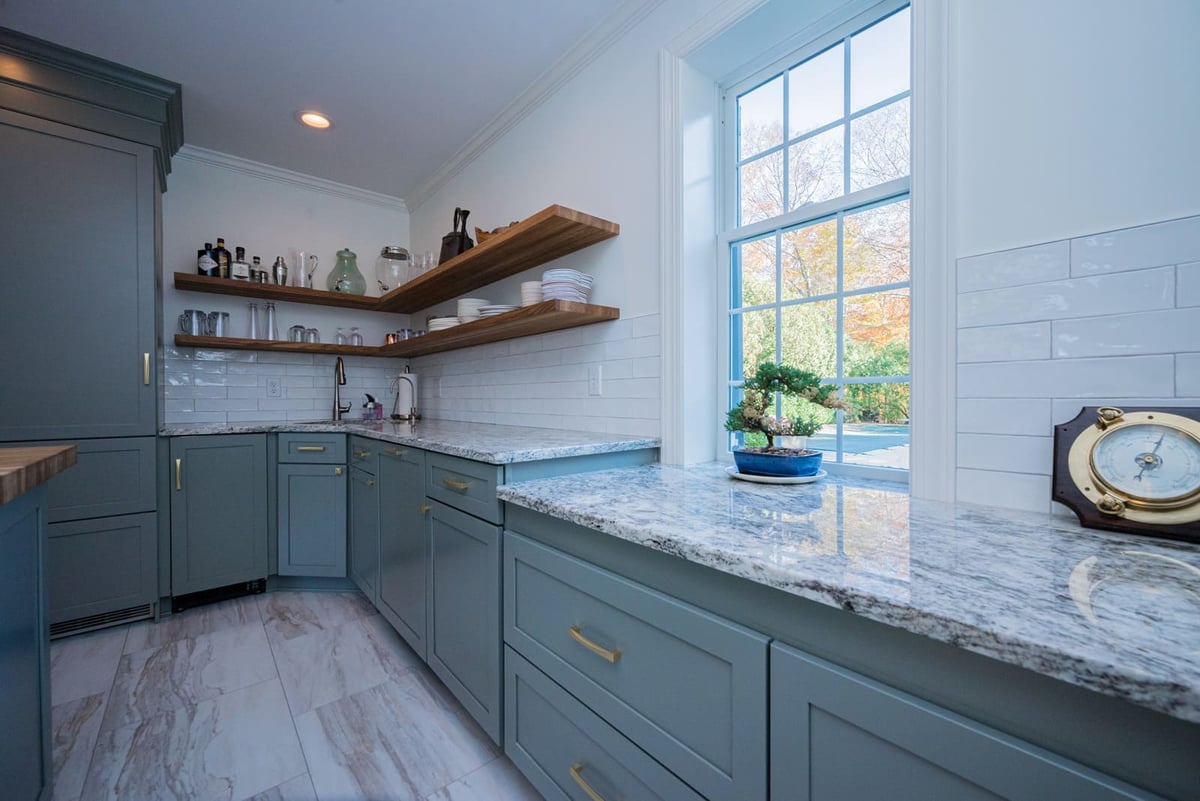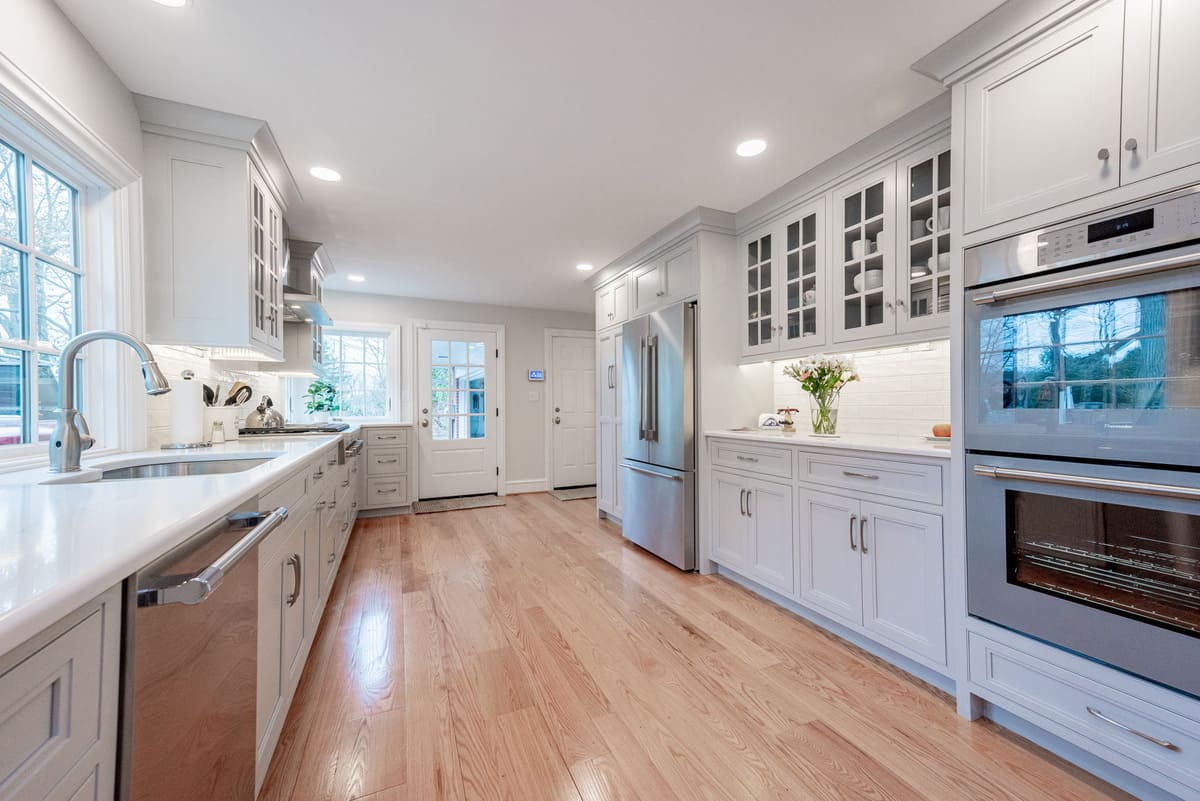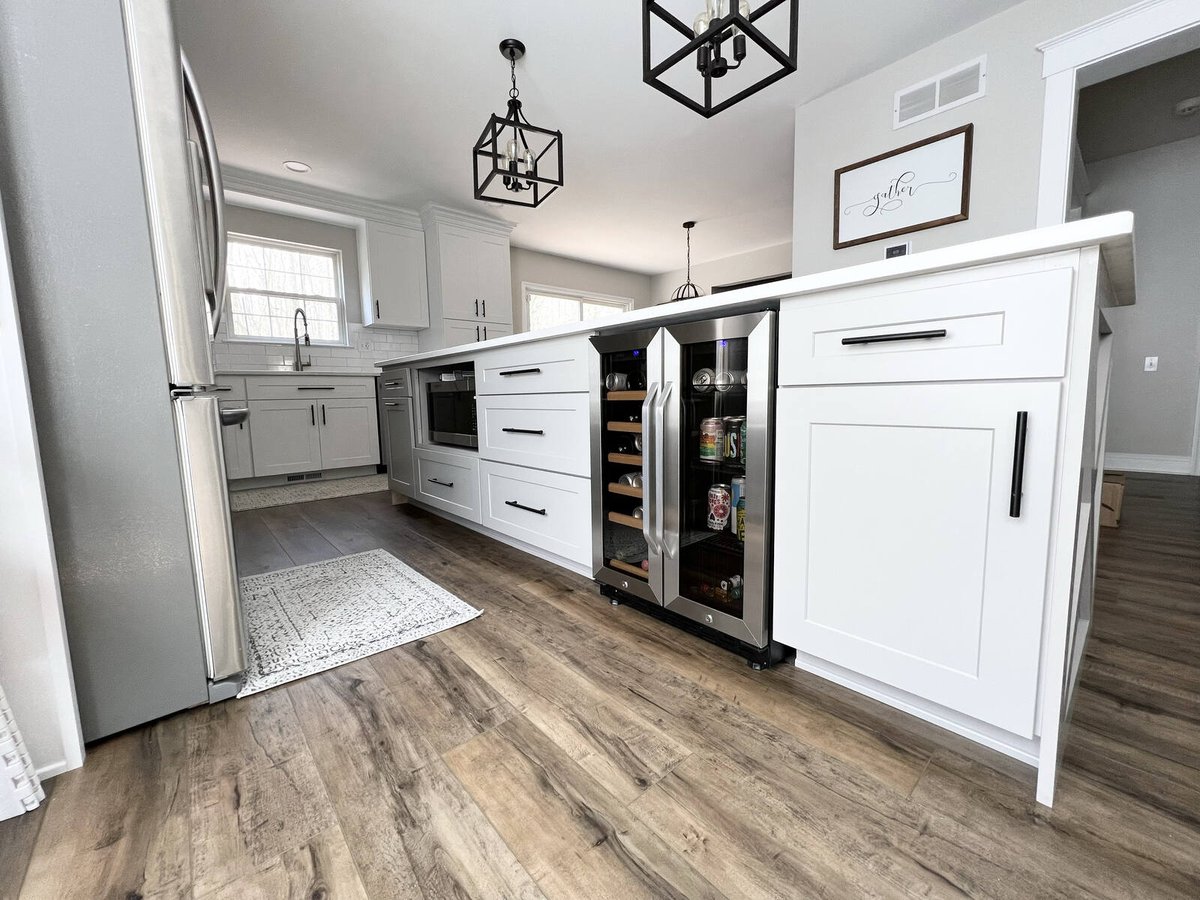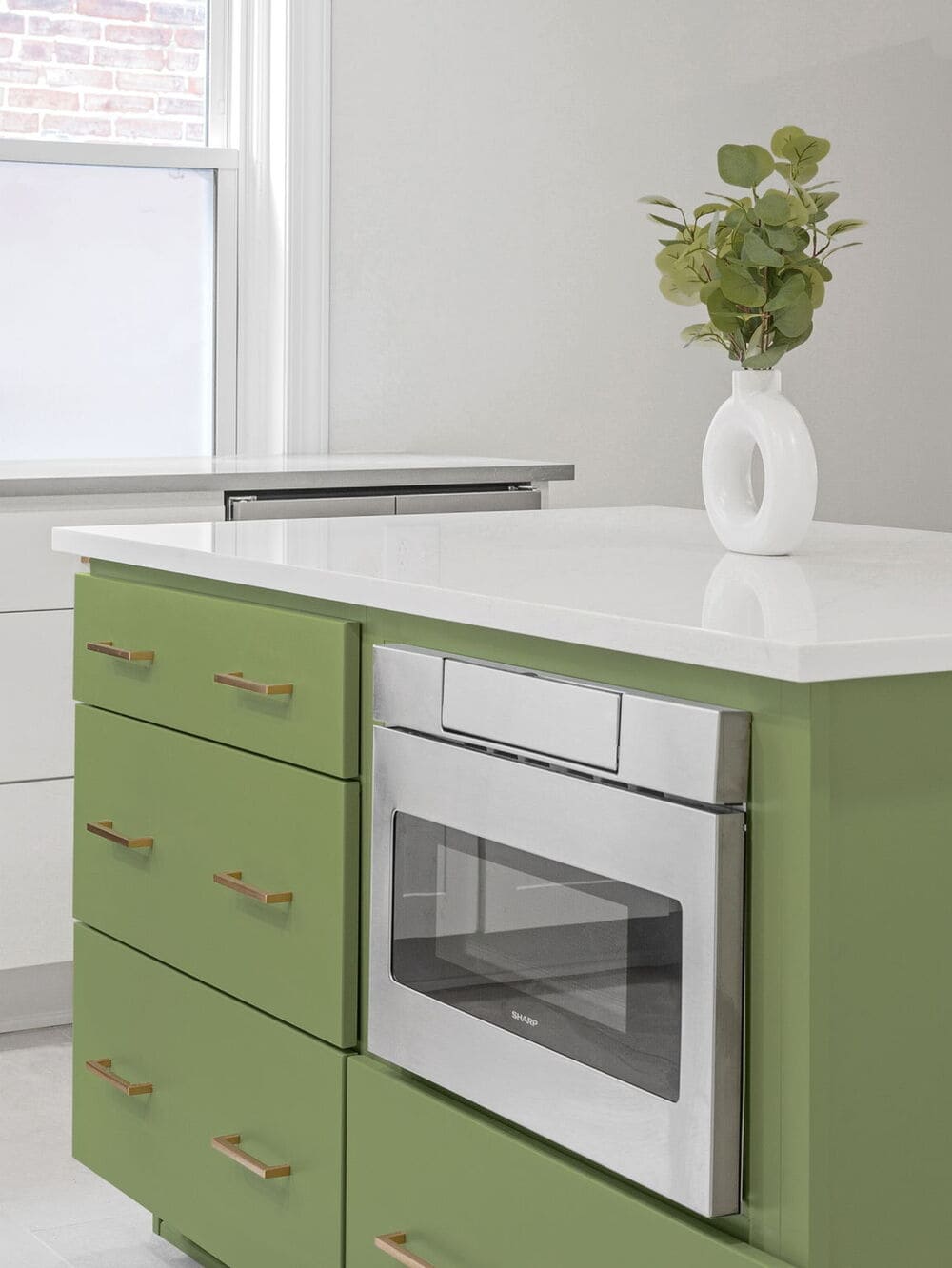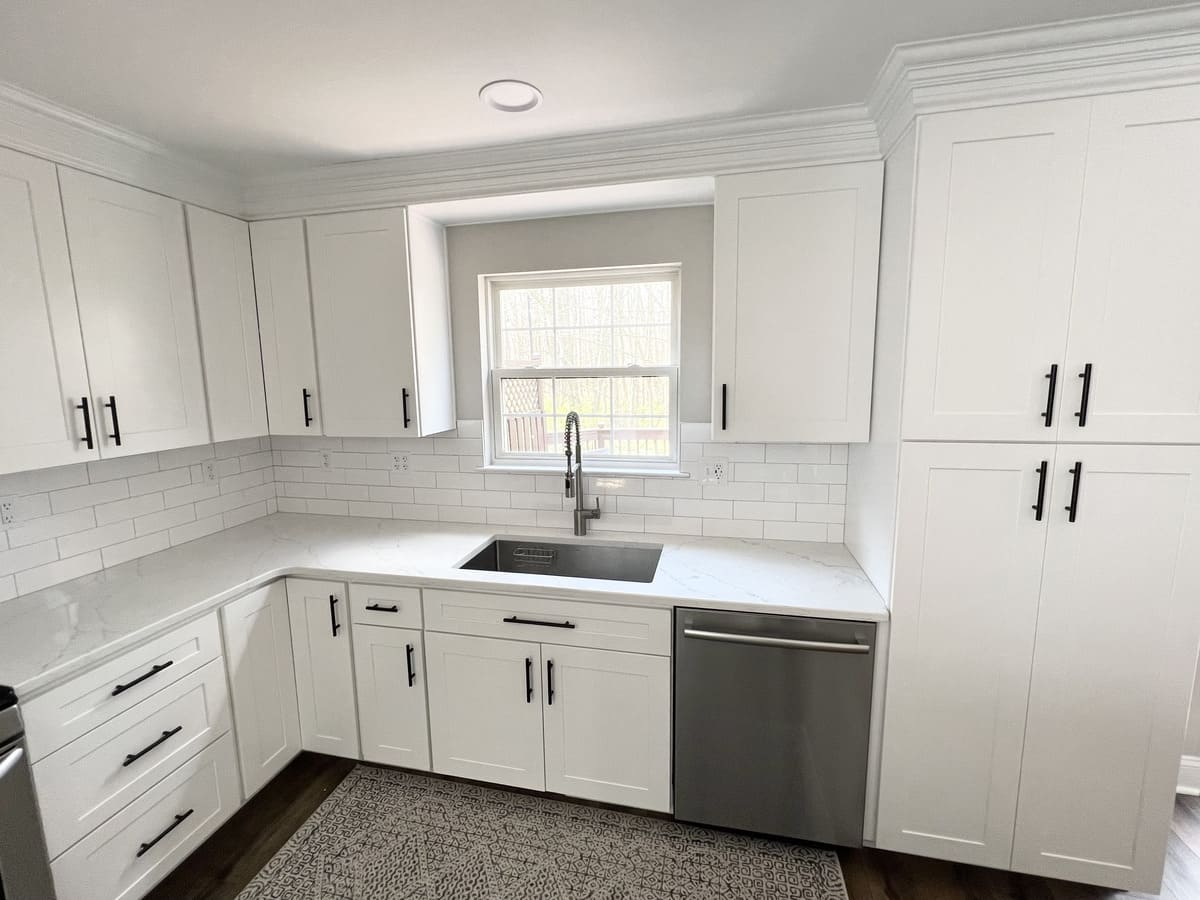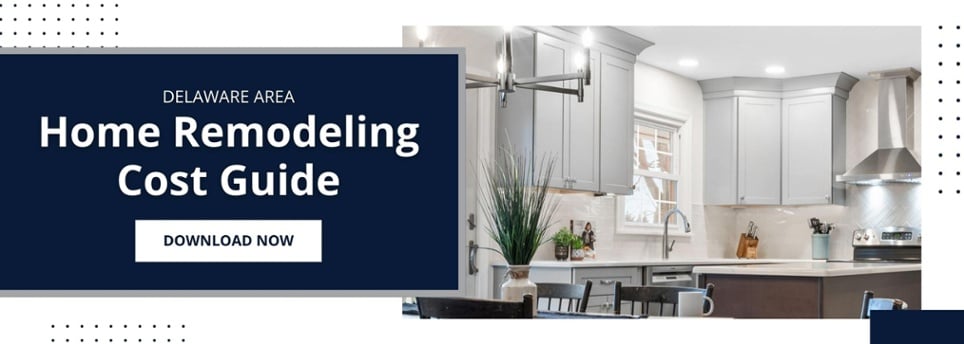The Best Kitchen Materials: Comparing Cost and Upkeep
Creating a new kitchen is an exciting wonderland of opportunities! Reviewing your material options for kitchen renovation is an important step to ensure make the best selections for the cost, performance, and aesthetic you're after. Today, we're dissecting your options for countertops, flooring, and cabinets to help you find your fit for your kitchen remodel in Delaware.
Choosing the Right Countertop Material
When it comes to kitchen renovations, selecting the right countertop material is a crucial decision. The countertop not only serves as a functional workspace but also contributes to the overall aesthetic appeal of your kitchen. Today, we will explore different types of countertops, their durability, maintenance requirements, and pricing.
Durability and Maintenance of Countertop Materials
Granite Countertops
Granite is a popular choice for kitchen countertops due to its natural beauty and durability. It is resistant to scratches, heat, and stains. While granite requires periodic sealing to maintain its pristine condition, it is generally considered a low-maintenance option. The cost of granite countertops varies based on factors such as color, pattern, and thickness.
Quartz Countertops
Quartz countertops offer the best of both worlds: durability and low maintenance. Composed of natural quartz crystals and resin binders, quartz is non-porous, making it resistant to stains and bacteria. It doesn't require sealing and is highly durable against scratches and heat. Although quartz countertops may have a slightly higher upfront cost compared to granite, their long-term durability and ease of maintenance make them a popular choice.
Marble Countertops
Marble countertops exude elegance and timeless beauty. However, they are more prone to scratches, stains, and etching from acidic substances. Regular sealing is necessary to protect the marble surface and maintain its appearance. The cost of marble countertops can vary significantly, depending on the type of marble and its rarity.
Soapstone Countertops
Soapstone is a natural stone with a distinct matte finish and a smooth, soap-like texture. It is highly resistant to heat and stains, making it an excellent choice for kitchen countertops. Soapstone requires periodic oiling to enhance its natural darkening and maintain its integrity. The cost of a soapstone countertop falls within a moderate price range.
Wood Countertops
Wood countertops, particularly those made from high-quality hardwoods such as maple, cherry, or oak, add warmth and character to a kitchen. They are generally more susceptible to scratches and water damage compared to stone countertops. Regular sealing and proper upkeep are essential to protect the wood surface. The cost of wood countertops can vary based on the type of wood and customization.
Comparing Countertop Costs
Countertop pricing can vary significantly based on factors such as material, quality, thickness, and installation. Here is a general overview of the cost range for different countertop materials:
-
Granite Countertop Price: On average, granite countertops range from $50 to $200 per square foot, including installation costs.
-
Quartz Countertop Price: The cost of quartz countertops typically falls between $60 and $150 per square foot, including installation.
%20(1).jpg?width=1100&height=1242&name=7-web-or-mls-Final-6%20(2)%20(1).jpg)
3. Marble Countertop Cost: Marble countertops can range from $75 to $250 per square foot, including installation. However, rare and exotic marbles may be more expensive.
4. Soapstone Countertop Cost: Soapstone countertops generally range from $70 to $120 per square foot, including installation.
Easiest Countertop to Maintain
Quartz countertops are often regarded as the easiest to maintain. Since they are non-porous, they do not require sealing, and their smooth surface makes cleaning a breeze. Additionally, quartz countertops are highly resistant to stains and scratches, making them ideal for busy kitchens where spills and food preparation are common.
Flooring Materials Comparison
Flooring also has a significant impact on the aesthetic and kitchen maintenance. When it comes to kitchen flooring options, you can choose between vinyl, hardwood, tile, linoleum, and even less common materials, such as bamboo and cork.
Types of Tile Flooring
Natural Stone Tiles
Natural stone tiles are a popular choice for creating a luxurious and elegant flooring appearance in kitchens. Their unique veining and textures add character and sophistication to the space. However, it's important to note that natural stone tiles are porous, which makes them more susceptible to staining and water damage. To protect their beauty and longevity, regular application of a quality stone sealer is necessary. While natural stone tiles may require a bit more maintenance compared to other options, their stunning visual impact makes them a sought-after choice for those seeking a truly upscale kitchen flooring solution.
Porcelain Tiles
When it comes to durability and low maintenance, porcelain tiles stand out as an excellent option for kitchen flooring. Their inherent strength and resilience make them highly resistant to chips, scratches, and impact. Unlike some other types of tiles, porcelain tiles have consistent coloring throughout the material, which means any chips or scratches are less noticeable. Additionally, porcelain tiles are impervious to water and stains, making them an ideal choice for busy kitchens. With proper care, porcelain tiles can maintain their appearance and function for many years, making them a long-lasting investment for your kitchen remodel.
Ceramic Tiles
Ceramic tiles offer a blend of durability and versatility for kitchen applications. They are fired and glazed, resulting in a non-porous surface that is resistant to water and stains. Like porcelain tiles, ceramic tiles are known for their durability and ease of maintenance. However, it's important to note that if ceramic tiles chip, the underlying clay color will be exposed, which may affect their suitability for high-traffic areas like kitchens. Despite this, ceramic tiles remain an attractive option for walls in kitchen spaces, where their aesthetic appeal and ease of cleaning can enhance the overall design.
Hardwood Flooring
Hardwood is another durable flooring material but, like natural stone tiles, has its limitations in the kitchen, where moisture and liquid stains are inevitable. Modern sealers and polyurethane finishes are helpful in addressing the problem, but you will still see degradation over time, which could be unappealing when considered in tandem with the higher cost of hardwood flooring.
Vinyl Flooring
Luxury vinyl plank (LVP) is one of the most versatile kitchen flooring solutions. Not only is most vinyl flooring entirely moisture-resistant and highly durable, but it is available in styles and colors that mimic other materials. It is comparatively cheaper than hardwood and tile and holds up well in high-traffic spaces.
Bamboo Flooring
Bamboo flooring is a sustainable and eco-friendly option that has gained popularity in recent years. Made from rapidly renewable bamboo grass, this flooring material offers a unique and contemporary look to kitchens. Bamboo is known for its durability and strength, making it suitable for busy kitchens. It is also resistant to moisture and easy to clean, making it a practical choice for kitchens. With its natural grain patterns and variety of finishes, bamboo flooring can add warmth and character to any kitchen space. Moreover, its sustainability and eco-conscious features make it an appealing choice for environmentally conscious homeowners.
Cork Flooring
Cork flooring is a versatile and eco-friendly option that offers several benefits for kitchen spaces. Harvested from the bark of the cork oak tree, this renewable material provides a cushioned and comfortable feel underfoot, making it ideal for long periods of standing in the kitchen. Cork is naturally resistant to moisture, mold, and mildew, making it a suitable choice for kitchens prone to spills and high humidity. It also possesses excellent acoustic and thermal insulation properties, helping to reduce noise and maintain a comfortable temperature in the kitchen. With its unique and natural patterns, cork flooring adds a touch of warmth and charm to any kitchen decor.
Concrete Flooring
Concrete flooring has become a popular choice for modern and industrial-style kitchens. With its sleek and minimalist appearance, concrete offers a contemporary and urban aesthetic. Concrete floors can be polished and sealed to create a smooth and durable surface that is resistant to stains and scratches. They also provide excellent thermal mass, helping to regulate temperatures in the kitchen. Additionally, concrete can be customized with various colors, stains, and decorative elements to match your kitchen's style and personal taste. While concrete floors may feel hard underfoot, adding area rugs or mats can provide both comfort and visual interest.
Exploring Cabinet Cost
Natural Wood Vs. Composite Cabinets
Cabinets are another key factor that define your kitchen’s character. They comprise a large part of the surface area of your kitchen, so getting the cabinets right is extra important. Your material options are more limited when it comes to cabinets: You can opt for solid wood cabinets or an engineered wood, such as fiberboard, particleboard or plywood. We recommend opting for engineered woods for kitchen remodels as they offer greater stability compared to natural wood, which is prone to warping. Moreover, engineered wood cabinets are cost-effective while maintaining reliability.
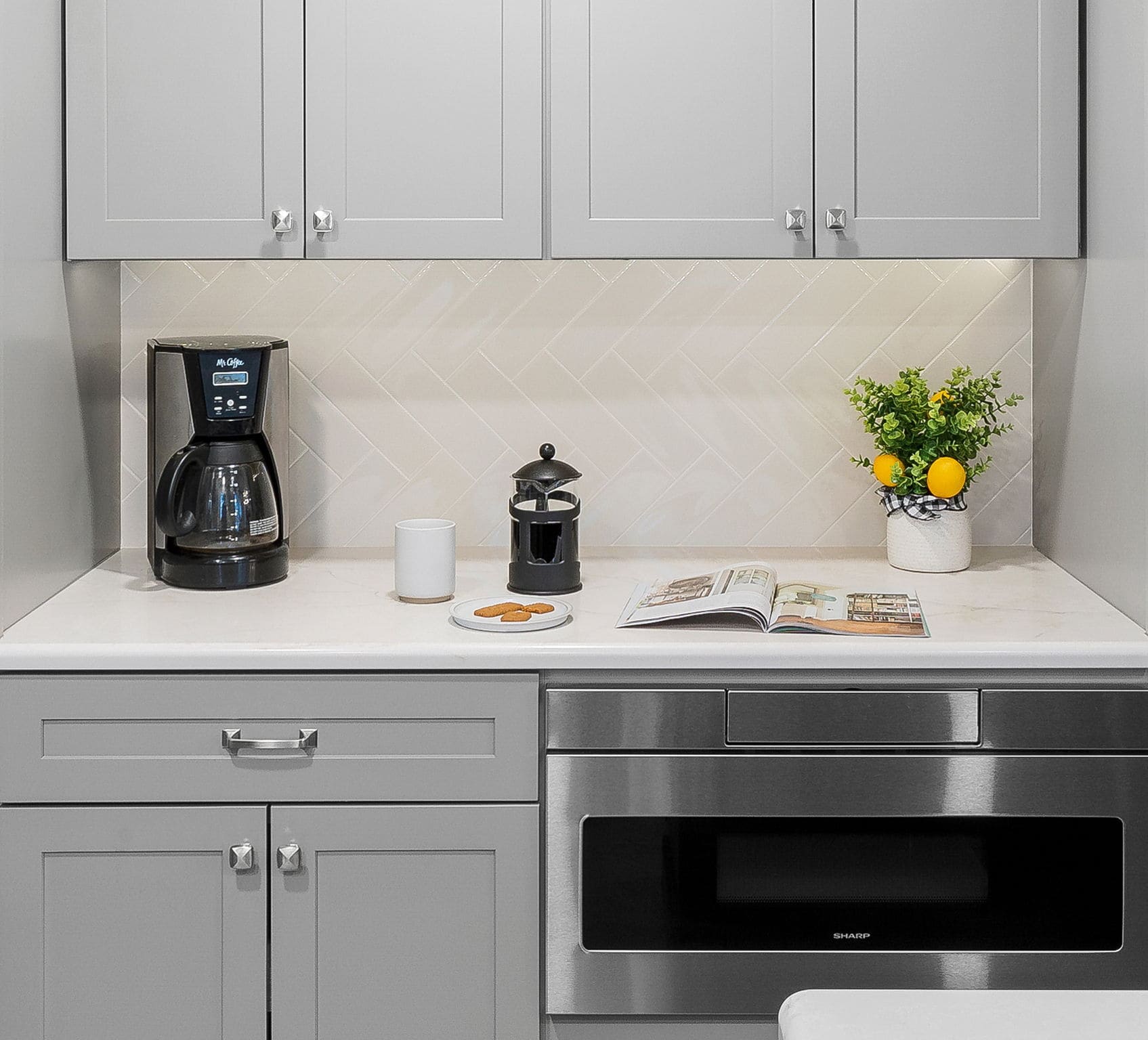
Another decision you must make is whether to use production or custom cabinetry. While custom cabinets are more expensive than stock cabinets, they can be built to your specifications so they fit the exact dimensions of your kitchen without any wasted space. Additionally, they are built by skilled carpenters, making them a higher quality and long-lasting.
The Cost Range for Kitchen Cabinets: Factors That Affect Pricing
When planning a kitchen remodel, understanding the cost range for kitchen cabinets is essential. The price of kitchen cabinets can vary significantly based on several factors. Here's a breakdown of the key elements that influence cabinet costs:
Cabinet Material
The choice of cabinet material greatly impacts pricing. Natural wood cabinets, such as oak, maple, or cherry, tend to be more expensive due to their premium quality and aesthetic appeal. On the other hand, engineered wood options like plywood, MDF (medium-density fiberboard), or particleboard are generally more affordable.
Cabinet Construction
The construction method and quality of craftsmanship contribute to cabinet costs. Custom cabinets, meticulously crafted by skilled carpenters, are typically more expensive than stock or semi-custom cabinets. Custom cabinets offer greater design flexibility, unique features, and superior durability.
Cabinet Style and Design
The complexity and intricacy of the cabinet style and design influence pricing. Intricate detailing, ornate moldings, specialty finishes, and decorative elements can increase the cost of cabinets. Simple and minimalist cabinet designs generally fall on the lower end of the price spectrum.
Cabinet Size and Configuration
The size and configuration of your kitchen cabinets impact the total cost. Larger kitchens requiring more cabinets will naturally cost more. Additionally, custom cabinet sizes and configurations tailored to fit unique spaces or specific storage needs may involve additional costs.
Accessories and Upgrades
Including accessories and upgrades can add to the overall cost of kitchen cabinets. Features like pull-out drawers, organizational inserts, soft-close mechanisms, and built-in lighting enhance functionality but come with an additional price tag.
Brand and Supplier
The brand reputation and the supplier you choose can affect the cost of kitchen cabinets. Well-known brands or custom cabinet makers often command higher prices compared to lesser-known or local suppliers. It's essential to balance quality and cost by exploring different options and comparing quotes.
It's important to note that kitchen cabinet costs are typically calculated per linear foot or by the overall cabinet configuration. The cost range for kitchen cabinets can vary widely, starting from a few thousand dollars for budget-friendly options and ranging up to tens of thousands of dollars for high-end custom cabinets. Your kitchen contractor will help you understand your options and the associated costs during your remodel.
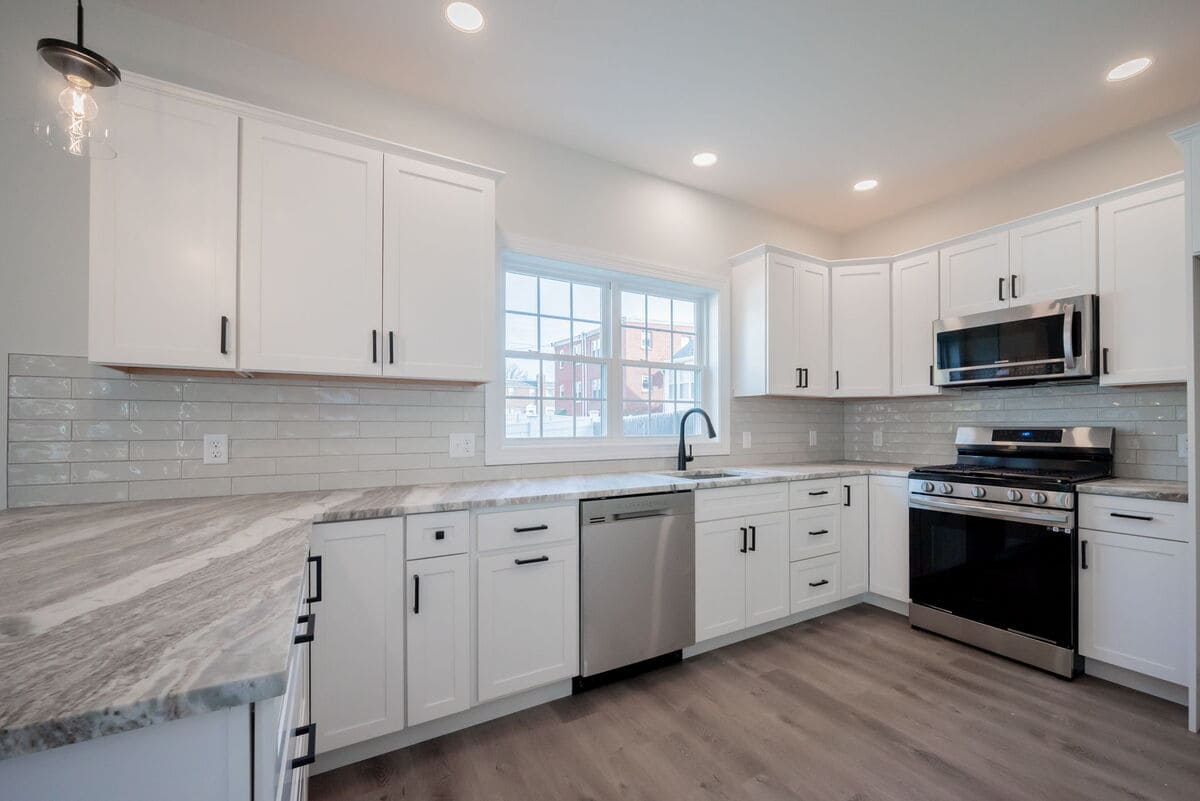
Kitchen Remodel: Get Your Personalized Cost Comparison
Kitchens are a great place to begin remodeling your home. It returns excellent ROI and changes your daily experience. The materials you choose for your flooring, cabinets, and countertops will greatly impact your overall cost and the value you extract in both the financial and emotional arena as you enjoy and maintain your space or resell. Our team at Bromwell Construction is ready to put our expertise to work for you, give you more personalized information on various materials, as well as the estimated cost based on current market rates to help you budget for your kitchen remodel while creating your vision for the space. We cannot wait to meet you. Let's connect today!

